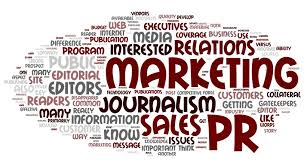
As PR professional or Marketing and Advertising professional you are often asked how public relations differs from marketing – it’s easy to describe from a tactical point of view, however the difficulty often arises in articulating how each role contributes to business success.
Does this sound like a silly question, but – Is there a difference between Marketing and PR? Let’s have a look at the definitions first.
Definition of ‘Marketing’
The activities of a company associated with buying and selling a product or service. It includes advertising, selling and delivering products to people. People who work in marketing departments of companies try to get the attention of target audiences by using slogans, packaging design, celebrity endorsements and general media exposure. The four ‘Ps’ of marketing are product, place, price and promotion.
Definition of ‘Public Relations – PR’
PR is the act of communicating with the public. Although not inherent in the definition, a public relations, or “PR” for short, is often thought of as “spin,” with the goal being to present the person, company or event in the best light possible. Most major companies have a PR department or utilize the services of an outside firm.
Here are some useful analogies:
- Activities / tactics:
Marketing generally covers promotional, direct marketing and advertising which seeks to return direct sales; whereas PR is focused on reputation management through generating positive media coverage and stakeholder communication. - Target audiences:
Marketing aims to reach current and potential customers, whereas public relations is all about maintaining positive relationships with anyone who has an interest in the organisation or brand. This covers a broader audience across customers and media, to employees and shareholders. - Two separate goals:
The goals for marketing teams are to reach consumers and make them think, believe or do some kind of sales focused action. Essentially it is about selling the product or service. Whereas public relations is about selling the company or brand through positively managing the communication channels between a company and its stakeholders. Overall, marketing activities are trying to achieve direct revenue, while PR is trying to drive a positive reputation. - Legitimacy of messages:
Messages delivered through PR channels such as articles, conference speakers or reputable bloggers are subconsciously regarded by consumers as more legitimate than those presented through marketing tactics. Generally, people can clearly recognise that advertising and marketing are driven by a company’s desire to increase sales. However articles that have a well-known journalist’s name on them, or presentations by someone classified as an industry expert are more likely to be received by the consumer as a credible source. - Business ROI:
Marketing is generally defined as a business investment – paid branding and promotional activities with new customers being the ROI. Whereas PR is classified as free exposure for increasing credibility around a company’s image. It is usually more difficult to measure ROI for PR than it is for marketing, because it’s harder to demonstrate a change in perception or beliefs, as opposed to direct sales. - Longevity:
Marketing is a relatively short term activity, whereas PR reaps its benefits over a longer period of time. While marketing seeks to drive instant, tangible sales success, the benefits of a PR program can be viewed as a long term investment that a company would recognise for future achievements.
What about Digital Marketing and Digital PR?
Similar to traditional channels, marketing in the digital space would be those activities that drive an instant action from the consumer, such as search marketing, ads, promotions and eDMs. The concept of Digital PR still remains as a relationship management function, with a strong focus on social media channels.
It has been proven that promotional marketing angles through social media can actually have a negative impact on a brand. This has resulted in a strong shift towards social media being categorised under the PR function.
What does this mean for business?
While it’s important for businesses to be able to articulate the differences between the two roles, it doesn’t change the reality that marketing and PR are as reliant on each other as a business is to their combined success. With the introduction of new technologies and the increased acceptance of PR by executive teams, the two functions have become more complex and move towards even more distinctively separate roles in a business.
That said, those companies who don’t get caught up on what’s marketing and what’s PR, and instead focus on identifying the most effective tools for delivering to their objectives, will have the most effective communication strategy.
Source: http://publicrelationssydney.com.au/what%E2%80%99s-the-real-difference-between-marketing-and-pr/ and http://www.investopedia.com/
